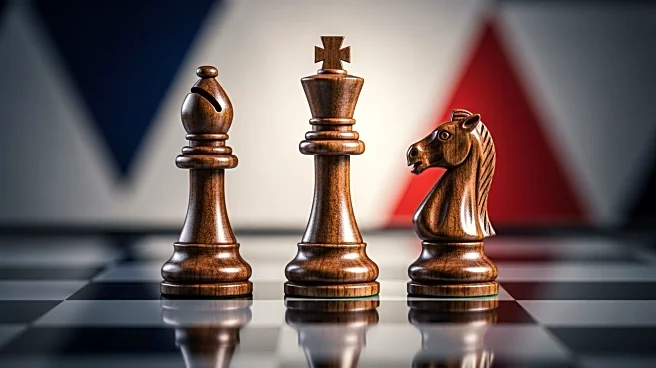What's Happening?
During the Shanghai Cooperation Organisation (SCO) meeting in Tianjin, China, leaders from China, India, and Russia demonstrated a united front amidst ongoing tensions with the United States. Chinese President Xi Jinping, Russian President Vladimir Putin, and Indian Prime Minister Narendra Modi were seen engaging warmly, projecting an image of solidarity. This meeting marked Modi's first visit to China in seven years, where he was seen pulling his counterparts closer, symbolizing camaraderie. The leaders exchanged greetings and shared light moments, with Modi laughing and clasping Putin's hands multiple times. The summit highlighted the growing partnership among these nations, which have various frictions with the U.S., as they seek to strengthen their ties and influence on the global stage.
Why It's Important?
The display of unity among China, India, and Russia at the SCO summit is significant as it underscores the shifting dynamics in global geopolitics. These countries, each having their own disputes with the United States, are positioning themselves as a counterbalance to Western influence. This alliance could impact U.S. foreign policy and economic strategies, as these nations collaborate on security and economic initiatives. The solidarity shown by Xi, Putin, and Modi may lead to increased cooperation in areas such as trade, military, and technology, potentially challenging U.S. dominance in these sectors. The meeting also reflects the broader trend of emerging powers seeking to redefine global governance structures.
What's Next?
The strengthened ties between China, India, and Russia could lead to more coordinated efforts in international forums, potentially influencing decisions on global security and economic policies. The SCO summit may pave the way for future collaborations in areas like infrastructure development, energy, and technology, which could alter existing alliances and trade patterns. As these nations continue to build their partnership, the U.S. may need to reassess its diplomatic and economic strategies to address the evolving geopolitical landscape. Observers will be watching for any formal agreements or joint initiatives that emerge from this newfound unity.
Beyond the Headlines
The unity displayed at the SCO summit may have deeper implications for global governance and the balance of power. As China, India, and Russia strengthen their ties, they could advocate for a multipolar world order, challenging the current U.S.-led system. This shift may influence international norms and regulations, particularly in areas like cybersecurity, environmental policies, and trade standards. The cultural and historical ties among these nations could also play a role in shaping their collective approach to global issues, potentially leading to a more diverse and inclusive international community.









